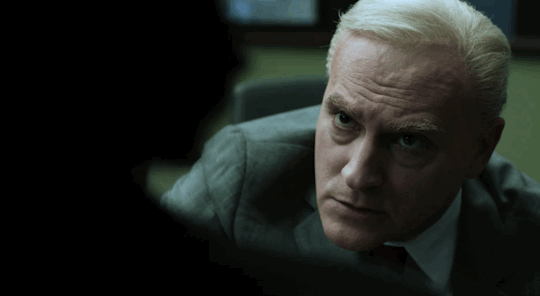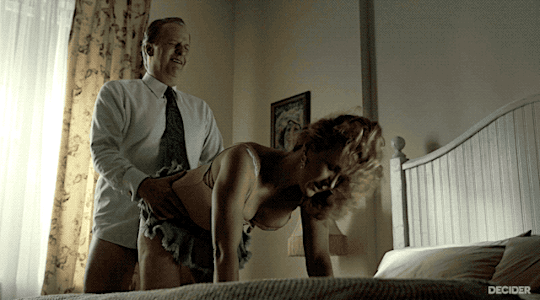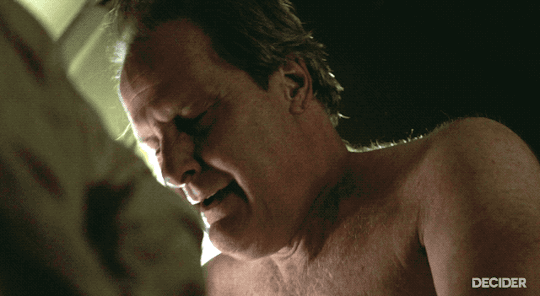Posts Tagged ‘the looming tower’
The 10 Best Musical TV Moments of 2018
January 1, 201910. Westworld: “Do the Strand” by Roxy Music
Few shows have been as guilty of music-cue abuse as Westworld. Jonathan Nolan and Lisa Joy’s leaden and labyrinthine sci-fi parable has folded an entire Spotify playlist of classic alt-ish rock songs into its narrative via instrumental arrangements by composer Ramin Djawadi. Give a listen to his best-in-field work on Game of Thrones and it’s painfully clear he can do much better than player-piano Radiohead or Japanophile remixes of Wu-Tang Clan’s “C.R.E.A.M.” or whatever.
This is what makes Westworld’s in-world cranking of Roxy Music’s boisterous 1973 hit “Do the Strand” so remarkable. Blasted at full volume by James Delos (Peter Mullan), the Scottish founder of the Westworld theme park (and, unbeknownst to him, one of its core artificial-intelligence experiments), glam rock’s answer to Led Zeppelin’s “Immigrant Song” sounds as unexpected in the dour songscape of this series as Delos’s “dance like no one is watching” behavior looks. Yet Bryan Ferry’s hedonistic lyrical promise of the next big thing — “There’s a new sensation, a fabulous creation” — and Brian Eno’s retro-futuristic flourishes as the band’s in-house effects guy fit Westworld’s themes like they were engineered in a lab to do exactly that.
This is always one of my favorite pieces to do: I wrote about the 10 best music cues of 2018 for Vulture. Definitely stick around for Number One.
“The Looming Tower” thoughts, Episode Ten: “9/11”
April 19, 2018Based on the talent involved, The Looming Tower could and should have been better. But with the task it faced and the approach it took, I’ll be damned if I can figure out how. Some things just weren’t meant to be dramas. So despite a slate of fine actors doing their best — and despite a scorching critique of the CIA, the Clinton and Bush administrations, and the Saudi royal family — The Looming Tower never built up into something more than a well-cast book report. It gets harder and harder to never forget.
I reviewed the final episode of The Looming Tower for Decider. The show never really worked, though it did give us a magnificent Michael Stuhlbarg performance (is there any other kind?) as, of all people, Richard Clarke.

“The Looming Tower” thoughts, Episode Eight: “A Very Special Relationship”
April 13, 2018Serious question: When the makers of The Looming Tower called this episode “A Very Special Relationship,” did they have Jeff Daniels’s graphic sex scenes in mind?


I wrote a whole bunch more about how the failure of The Looming Tower to make a cohesive character out of FBI anti-terrorism chief John O’Neill undermines a lot of the dramatic parallels the show is trying to make in my review of its eighth episode for Decider, but I also just want you to see these gifs.
“The Looming Tower” thoughts, Episode Seven: “The General”
March 31, 2018“And it’s one, two, three, what are we fighting for?” —Country Joe and the Fish, “I-Feel-Like-I’m-Fixin’-to-Die-Rag”
If there’s one thing that struck me about “The General,” the seventh episode of The Looming Tower, it’s that the answer to Country Joe MacDonald’s musical question is, as it always was, “not much.” Not much of value, anyway. Ostensibly depicting the investigation into the bombing of the USS Cole off the Yemeni coast, the episode is in fact about how interagency and international strife made a halfway decent investigation impossible. Most of the fighting that gets done here is between people who are supposed to be on the same side. Why are they doing it? As Country Joe put it, “Don’t ask me, I don’t give a damn.”
I reviewed this week’s episode of The Looming Tower, the first one where I started to think maybe they’re gonna run out of fuel for this story long before they run out of story to fuel, for Decider. The Looming Tower does not have the spark. It does not have the magic.
“The Looming Tower” thoughts, Episode Six: “Boys at War”
March 22, 2018Fittingly, director Michael Slovis and writer/showrunner Dan Futterman crafted a cinematically memorable version of the Cole bombing. After a long, slow, even placid build-up, the actual attack maintains the same feel and rhythm; if you didn’t know any better, you’d think this really was just a couple of guys and their nephew or something, out for a pleasant cruise, waving to the smiling sailors nearby. This isn’t some Euron Greyjoy–style pirate assault — it’s a sneak attack that no one saw coming even when they literally saw it coming. The cinematography is so fitting that it almost feels complicit.
The show’s done the character work to make the sequence stick in that respect, too. All those scenes of the bombers being friendly and joking around with one another are obviously reminiscent of what the FBI agents we’re also following around do, too. They’ve even got a kid sidekick whom they can playfully surprise and delight with their video camera, a bit of technology he’s never had the chance to experience before; the way they all repeat the word “zoom” and laugh when they use that feature to get a closer look at the Cole is genuinely funny and endearing if you put the context aside. But the show’s not really asking you to do that, since it provides its own context for what they’re doing: the murder of the kid’s family and friends by the United States, in an attack so senseless and unstoppable that the only way he can make sense of it is by magically attributing it to Shaytan himself. (The only hiccup is the Shaytan monologue, which overstays its welcome and drifts too far into otherizing “strange foreigner invokes demons and deities” territory.) Put it all together and you get that these are basically normal people, traumatized by injustice, and driven to kill for their countries and ideals in ways we too could understand.
When you’ve done all that, what does putting the kid on the boat add? We don’t need it for cinematic impact, for pathos, or to illustrate the human cost, since we’ve gotten all that already. It just feels indulgent, and oddly disrespectful of the facts to boot. Dramatic license is fine if you wanna create believable composite characters like Schmidt and Marsh in the CIA or Chesney and Stuart in the FBI, or even the kid himself. If you’re inserting a character in such a way that his presence would materially change the world’s understanding of the event that’s occurring, as the use of a literal child to suicide-bomb the U.S Navy surely would have done, that’s a whole different story. That it was all unnecessary only makes it worse. Have faith in the tragic truth.
I enjoyed writing about this week’s episode of The Looming Tower for Decider, one of those episodes that really helps you understand why what works works and what doesn’t doesn’t. This particular sequence was good to explore in light of the creative success of The Assassination of Gianni Versace, another true-crime series that takes necessary liberties and inferences, yet always feels on-point.
“The Looming Tower” thoughts, Episode Five: “Y2K”
March 22, 2018The Looming Tower is a cop show set in a world very much like our own: a world full of scumbags, banding together in little clandestine groups with a self-awarded licensed to kill on behalf of their scummy ideologies. Unlike the real world, however, the world of The Looming Tower has a magic-realist tinge to it. In Towerworld, there exist Cassandra-like oracles capable of seeing the future and its ocean of blood but utterly incapable of doing anything about it. In fact, to the characters, these unheeded, impotent prophets of doom are completely invisible. After all, they’re not characters themselves. They’re the audience.
I reviewed last week’s episode of The Looming Tower for Decider. It was the first one where the lethal folly of this War of the Shitheads really started getting to me.
“The Looming Tower” thoughts, Episode Four: “Mercury”
March 9, 2018Despite earning the respect of his bosses for his correct call against making the attacks, and lining up much-needed help cracking the CIA’s vault of secrecy from the Justice Department, John O’Neill’s a fuckin’ mess, man. Belying his on-top-of-the-world swagger, his lavish lifestyle of fine dining and $400 shoes (in 1998 money!) combined with the need to travel between three different romantic partners has buried him in debt. His credit cards get declined. He’s out of town for so long all the time that his wife and children barely tolerate him when he returns. Catholic cardinals fail to give him a reprieve to divorce his religiously devout missus and marry his equally devout (and deceived) girlfriend Liz, no matter how many Cohibas he smokes with them. Just to top it all off, his other other woman is planning a move to New York to be near him. He’s, uh, not thrilled.
And even when he’s right in this installment, he’s right about stuff that makes him seem prurient, rather than prophetic. In place of his many killer one-liners about how bin Laden wants us to go to war, maaaan, he’s pontificating about the “72 virgins” issue with his star agent Ali Soufan, who tells him it’s all bullshit. “Blow yourself up and win the pussy sweepstakes—it’s like consumer fraud,” O’Neill concludes. “And ironically, so fuckin’ American.” He’d know!
This is how Jeff Daniels can work: as a guy who seems to have all the advantages a wealthy white straight cis Christian man who’s got a high-ranking job in a law-enforcement agency in America’s cultural and political capitals can get, yet seems incapable of not pissing those privileges away. People keep trying to cast him as Wyatt Earp or Walter Cronkite, while his potential to portray a reasonably popular governor forced to leave office after getting caught using the state education fund to pay his mistress’s son’s orthodontist bill was right there all along.
Hey gang—I figured out Jeff Daniels’s strengths as a dramatic actor and wrote about them in my review of this week’s episode of The Looming Tower for Decider! What do you think of that, Jeff?

“The Looming Tower” thoughts, Episode Three: “Mistakes Were Made”
March 8, 2018The third episode of The Looming Tower was struck by two coordinated explosions. No, not the al-Qaeda-orchestrated embassy bombings in Kenya and Tanzania, nor the CIA-orchestrated tough-guy retaliatory strikes on an AQ training camp in Afghanistan and its, ahem, “chemical weapons facility” in Sudan. As if invoking the “two-for-two” principle that led American intelligence and defense officials to launch the latter attacks, writer Bash Doran and director John Dahl teamed with their actors to set off a double detonation of their own: the interrogation-room outburst of FBI investigator Robert Chesney, played by Bill Camp; and the furious freakout over being kept out of the loop on the airstrikes, potentially lethally, by his boss John O’Neill, played by Jeff Daniels. The first of these hit its target. The second was a dud. The difference between them says a lot about what these two actors, each likeable in his own way, have to offer.
[…]
I don’t blame Daniels for failing to deliver the dynamite that Camp cooks up in his similar scene, not entirely anyway. But it’s certainly true that Daniels is a far broader performer than Camp, even when the latter is screaming at the top of his lungs. His recent career has seen him repeatedly cast as ostensibly convincing figures of authority, be they good (his blustery Real News anchorman from Aaron Sorkin’s The Newsroom, whose name I can’t remember but whom I now always think of as “Jeff Newsroom” thanks to a vocal anti-Sorkin contingent on Twitter) or evil (his extravagantly bearded one-armed mass murderer in Netflix‘s Western series Godless, which feels like the part of a Broadway show’s run where a new actor takes over for the lead who originated the role, in this case most likely Jeff Bridges).
Yet these authority figures never actually convince. Again, the writing is often to blame, but either way it’s impossible to imagine a ham like his Newsroom character saving the moral heart of the journalism industry, or his pretentious, bible-quoting gunman becoming the most feared figure in the West in a show where Michelle Dockery and Merritt Wever both displayed more, ahem, true grit. His O’Neill commands respect insofar as we know he was right and his enemies were wrong, but Daniels is just the guy whose job it is to inhabit that suit of rectitude. He doesn’t wear it particularly well. (His secondary characteristic — an irresistible ladies’ man whose ruddy middle-aged machismo is irresistible to half a dozen different women half his age — is an even worse fit.)
I did a satisfyingly close read of the performances of Jeff Daniels and Bill Camp in my review of The Looming Tower’s third episode for Decider. Camp is the most underrated actor on television.
“The Looming Tower” thoughts, Episode Two: “Losing My Religion”
March 8, 2018“We’re at war.”
“Only if we want to be.”Welp, there you have it. That’s the game right there. That’s the whole megillah. “Losing My Religion”, Episode 2 of The Looming Tower, may have a too-cute-by-half title. (It’s a reference to our lapsed Catholic and observant Muslim FBI heroes dealing with his own sins in the former case and those of his correligionists in the other — relatively minor issues in the scheme of things). But that nine-word exchange between the CIA’s Strangelovean, bearded boffin Martin Schmidt and the FBI’s hard-drinkin’, hard-lovin’, law’n’order straight-shooter John O’Neill encapsulates the great debate that would shape the next 20 years of American history because of who winds up winning.
[…]
I’m a bit perplexed by complaints that the show is a sentimental look back at 9/11 with little to tell us about what happened afterwards. In the pilot, all the sniping and name-calling and backstabbing between agencies made me think it possible, even likely, that by showing us FBI, CIA, and DoD morons staging a pissing contest while people die, The Looming Tower would be more useful to us today than a deep dive into Islamist extremism would be. Now I see that while that element continues, so too does a blunt, bare-essentials critique of the War on Terror. Put it all together, and you’ve got a portrayal of an intelligence community that’s overworked, underinformed, and lacking in basic human empathy, helping to usher in America’s dying-empire phase. Again, look at today’s headlines and tell me this isn’t a valuable perspective.
I reviewed episode two of The Looming Tower for Decider. It’s a very straightforward show, but it certainly isn’t hidebound.
“The Looming Tower” thoughts, Episode One: “Now It Begins…”
March 1, 2018The Towers really do loom over The Looming Tower. They stand in the distance as John O’Neill, the FBI’s chief counterterrorism agent, complains to a colleague that the Bureau’s director slept through a nationally broadcast interview with Osama bin Laden, a sure sign that “we’re running out of time.” They show up again as he rides the train into Manhattan the night al Qaeda simultaneously blew up the U.S. embassies in Tanzania and Kenya, as he calls his best Arabic-speaking agent Ali Soufan to tell him “now it begins.” The presence of the Twin Towers is a commonplace in pre-9/11 period pieces, and of course they appear in countless films made before the attacks with little or no fanfare, a simple marker that the characters have woken up in the city that never sleeps — hell, I watched The Money Pit the other night and there they were in the opening credits, a recognizable Manhattan landmark meant to establish contrast with the bucolic, disintegrating suburban mansion Tom Hanks and Shelley Long were about to fall down in a lot. But their presence takes on extra heft in The Looming Tower. Only here do they loom over a man who dedicated his career to thwarting terrorist attacks, quit when bureaucratic infighting made his job impossible, then died mere weeks into his private-sector career as a security consultant when the World Trade Center collapsed on top of him. He was right, and it killed him.
I’m covering The Looming Tower for Decider, beginning with my review of the series premiere. It’s a pretty straightforward show as far as this one hour of it is concerned, but that’s probably the best way to play this. While I’ve read reviews saying the moment for this treatment of this material has passed, since it focuses on the American intelligence community exclusively rather than treating al Qaeda’s leaders and forerunners as co-protagonists the way the book did, I’m curious to see if it can transform itself into something that does speak to the present moment after all. A show about FBI, CIA, and DoD morons having a pissing contest while people die is probably more useful to us at this point than one about Islamist extremism anyway.
